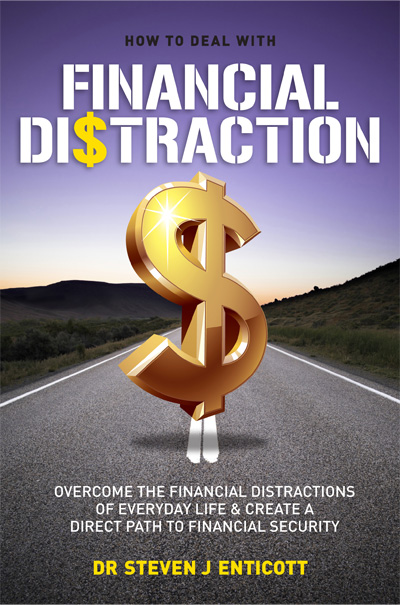Foreword
In Financial Distraction Dr Steven Enticott delivers the recipe for financial freedom and independence. As Steve says, he has written the book as a work of love – coupling his unbridled optimism with a big dose of care and attention to the details that can radically help (or hinder, if they are ignored) everyday Australians. Having known and engaged professionally with Steve for over a decade, it’s unsurprising that he combines this passion and care for the individual, along with the precision of a dedicated tax and accounting professional. The word “love” is one that Steve uses a lot – and he really means it!
When I first heard that Steve was writing this book, it struck me that Australia is ready for this type of “self-help” manual. Where once we lived in an uncomplicated and growing country with unbounded opportunity and appropriate time for leisure, we are now faced with complexity most everywhere we look. We work longer hours than ever before, striving to get ahead quicker and better than our parents did. We place our financial faith in owning our own home, and rapidly accumulate levels of debt that our parents would never have dreamed of. Most of us have the benefit of compulsory superannuation – but the modest returns that are typical from mainstream superannuation providers (coupled with the disgrace that was the GFC) means that personal financial freedom is something that may be a long way off for many of us. And as Steve highlights, adversity like divorce, ill health and the “hard yards” that are typical for most of us in small business, can make it really hard to get ahead in life.
The big difference in Financial Distraction is that Steve writes from the perspective of years of practical experience – formed with his passion for knowledge and higher learning and with Steve’s love of humankind clearly in evidence on every page. How many suburban accountants do you know that have a PhD? (And a PhD focusing on financial derivatives, to boot!) So when Steve sets outs his recipe for overcoming the financial distractions that prevent so many of us from living a life of financial freedom, he clearly does so with technical credibility and accuracy.
That’s something that deserves a little more comment. For most Australians, the first step they take towards financial freedom leads to a trip to the local financial planner or accountant. As Steve says in his book, there are many caring and literate financial planners and accountants in Australia. In my experience as a trainer and consultant to the financial planning industry, I can certainly attest to that – and may your search for an adviser lead you to one of the “good guys.” Armed with Financial Distraction as your guide, you may well find a good adviser (or do it yourself) – but beware of the pitfalls that surround the typical financial adviser or accountant.
The problem is that the major institutions that own most financial advisory firms, and the researchers and “asset consultants” that are the backbone of the independent boutique financial advisory businesses, live in a textbook world that is almost completely out of synch with our modern reality. Investment returns are measured by these “professionals” in what are cryptically referenced against “rolling 7-year periods” – a way of looking at average returns over a very long period of time. Large wholesale investment management systems are “blind” to the specific needs and aspirations of individuals – so they justify their existence based on how their returns compare to long-term averages.
The irrelevance of the traditional approach was highlighted by the GFC – where even the world’s best “diversified” portfolios (ie, professionally designed and constructed according to the rules of the “rolling 7-year returns” approach) fell by up to 50%. Five years later, most of these professionally designed portfolios are still way below their pre-GFC values.
A minority of professional investment managers and financial advisers have re-booted to try to overcome these problems, but for most it’s business as usual. The problem has started to become publicized and politicized, with ex‑Treasury Secretary Ken Henry making public his criticism of the traditional approach in 2012,when he highlighted the problem he calls “sequencing risk.” What he means by that slogan is how bad/damaging a severe fall in asset prices can be to someone who is about to (or has) retired. Traditionally constructed portfolios – like the ones that typical financial advisers will prepare for you – assume that an investor can achieve “average” returns if they invest for a long enough period of time. Sequencing risk points out that a big market fall late in life will be very hard to overcome – there just isn’t enough time or income to allow the portfolio value to rise to the level needed for a suitable retirement.
You won’t find acknowledgment of these problems from a traditional financial adviser or accountant – and so it’s vibrantly refreshing to read Financial Distraction – because Steve so candidly and openly shows you the tips and details of successful investing that he has accumulated over his professional life.
Financial Distraction highlights some of the usual methods for building financial prosperity – like starting early, sound budgeting, owning your own home, and utilizing superannuation – but then builds on Steve’s “Three Pillars” approach to introduce the concepts of tax-effective investing. The chapters on “good debt” and “bad debt” are crucial for all Australians to understand – and for any parent of young adults moving into the crosshairs of our major lending institutions, showing them these chapters on the problems that debt can cause will be an important game changer.
Financial Distraction then moves onto some seriously good analysis of the benefits and pitfalls of property and share investing. It introduces concepts like low cost Exchange Traded Funds, share portfolio protection – and the great power of the “legal onshore tax haven” which our Self Managed Super Fund (“SMSF”) provides. The chapters on investing are rounded out with easy to understand detail on farming in your SMSF, the use of trusts and estate planning ideas, and efficient structuring for small business owners.
Being grounded in the real world means that Steve also spends some time in his book, on the issues around financial recovery from divorce. If half of all marriages end up in divorce, this material must be highly relevant for many Australians.
Through all of Financial Distraction, Steve Enticott flavours his advice with the practical optimism that is his guiding philosophy: “Do Something – NEVER Do Nothing.” For any Australian looking for a practical, easy to understand guide to achieving financial freedom (and based on a technically highly accurate approach),Financial Distraction is a must read.
Tony Rumble, PhD
Founder, ASX Listed Products Accreditation Course (“LPAC Online”).
About the Author

Dr Steven J Enticott

Steve Enticott provides his advice with the practical optimism that is his guiding philosophy:
"Do Something – NEVER DO NOTHING."
For any Australian looking for a practical, easy to understand guide to achieving financial freedom, Financial Distraction is a must read.
Tony Rumble, PhD
Founder, ASX Listed Products Accreditation Course